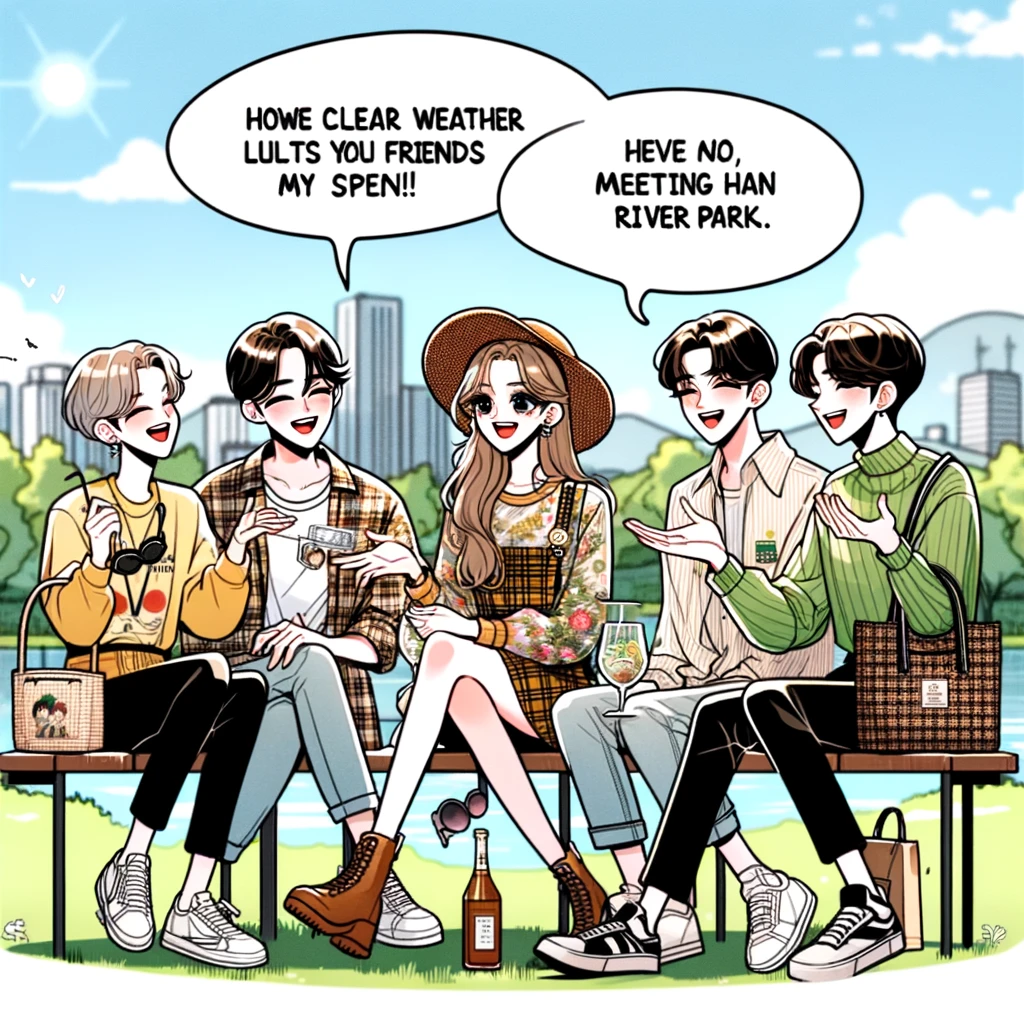1. 맑다 (malkda) – Clear
Imagine a clear day in Seoul, perfect for a leisurely stroll through the bustling streets of Hongdae.
Example Sentences:
- 오늘 날씨가 정말 맑아서 기분이 좋아요. (The weather is so clear today, it makes me happy.)
- 맑은 날에는 한강 공원에서 친구들과 만나고 싶어요. (On clear days, I want to meet friends at Han River Park.)
Cultural Insight:
Clear days are often celebrated in Korea with outdoor festivals and concerts, where many K-pop events take place, making it a perfect time for fans to gather and enjoy music under the open sky.
2. 흐리다 (heureuda) – Cloudy
Cloudy days in Korea can bring a sense of mystery and reflection, often depicted in K-pop music videos with introspective themes.
Example Sentences:
- 오늘은 하늘이 흐려서 산책하기 좋은 날씨예요. (Today’s cloudy sky makes it a good day for a walk.)
- 흐린 날에는 카페에서 조용히 음악을 듣는 것을 좋아해요. (On cloudy days, I like to listen to music quietly in a cafe.)
Cultural Insight:
Cloudy days are perfect for visiting places like Seoraksan National Park or Nami Island, where the soft light enhances the natural beauty, making it a popular setting for filming dramas and music videos.
3. 비 오다 (bi oda) – Rain
Rain in Korea is not just a weather condition; it’s an experience. Many K-pop songs use rain as a metaphor for emotional depth and renewal.
Example Sentences:
- 비가 오는 날엔 집에서 편안하게 쉬고 싶어요. (On rainy days, I want to rest comfortably at home.)
- 비 오는 밤, K-pop 발라드를 들으며 감정에 젖어보세요. (On a rainy night, immerse yourself in emotions with K-pop ballads.)
Cultural Insight:
The first snow in Korea holds a romantic notion, believed to bring true love if shared with a special someone. This poetic sentiment is frequently captured in K-pop lyrics, celebrating the magical moment of the season’s first snowfall.
4. 눈 오다 (nun oda) – Snow
Snow transforms Korea into a winter wonderland, inspiring some of the most beautiful and romantic K-pop songs.
Example Sentences:
- 첫눈이 오면, 우리는 영원한 사랑을 약속했어요. (When the first snow falls, we promise eternal love.)
- 겨울에 눈이 내리면, 서울은 더욱 아름다워져요. (When it snows in winter, Seoul becomes even more beautiful.)
5. 바람 부다 (baram buda) – Windy
The wind in Korea carries stories from the ancient palaces of Seoul to the modern skyscrapers, often referenced in K-pop songs symbolizing change or emotional turmoil.
Example Sentences:
- 가을 바람이 부는 날, 낙엽을 밟으며 걸어보세요. (On a windy autumn day, try walking on the fallen leaves.)
- 바람이 세게 부는 날엔 집에서 책을 읽는 게 좋아요. (On a windy day, it’s nice to read a book at home.)
6. 습하다 (seuphada) – Humid
Humidity in Korea can be intense, especially during the monsoon season, affecting daily life and activities. K-pop songs sometimes use this weather condition to describe sticky situations or intense emotions.
Example Sentences:
- 여름엔 날씨가 너무 습해서 불편해요. (In summer, the weather is so humid that it’s uncomfortable.)
- 습한 날씨 때문에 머리카락이 자꾸만 푸석해져요. (Because of the humid weather, my hair keeps getting frizzy.)
7. 건조하다 (geonjohada) – Dry
The dry season brings about a different aspect of Korea, often seen in the crisp clear skies perfect for outdoor K-pop concerts.
Example Sentences:
- 겨울에는 날씨가 건조해서 항상 로션을 발라야 해요. (In winter, the weather is dry, so I always have to apply lotion.)
- 건조한 날씨에는 물을 많이 마셔야 해요. (You need to drink a lot of water in dry weather.)
8. 덥다 (deopda) – Hot
Hot summer days in Korea are for beach outings, ice creams, and vibrant K-pop summer comebacks.
Example Sentences:
- 오늘 날씨가 너무 더워서 바깥 활동하기 힘들어요. (It’s too hot today for outdoor activities.)
- 여름엔 더운 날씨 때문에 시원한 음료가 생각나요. (In summer, the hot weather makes me crave cool drinks.)
9. 춥다 (chupda) – Cold
The cold of Korean winters is often romanticized in K-pop, with songs about longing and warmth.
Example Sentences:
- 겨울이 되면 날씨가 춥기 때문에 따뜻하게 입어야 해요. (In winter, you need to dress warmly because the weather gets cold.)
- 춥다고 집에만 있지 말고 겨울 축제를 즐겨 보세요. (Don’t just stay at home because it’s cold; enjoy the winter festivals.)
10. 안개 (angae) – Fog
Fog adds a mystical layer to Korea’s landscapes, often used in K-pop to create an atmosphere of mystery or introspection.
Example Sentences:
- 아침에 일어났을 때 창밖이 안개로 가득했어요. (When I woke up in the morning, the window was full of fog.)
- 안개가 많이 낀 날에는 운전할 때 조심해야 해요. (On foggy days, you need to be careful when driving.)
Cultural Insight:
Koreans have a beautiful tradition related to the first snow of the year, believing that wishes made during the first snow will come true. This romantic belief is a common theme in K-pop songs, highlighting the magic and anticipation of winter.
By exploring these ten weather-related vocabulary words, K-pop fans can deepen their connection to the language and culture, enriching their experience as they enjoy their favorite music. Whether discussing the weather or expressing emotions through the metaphor of seasonal changes, these terms open up new avenues for understanding and engaging with Korean language and culture.



